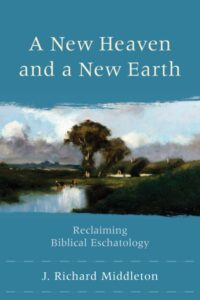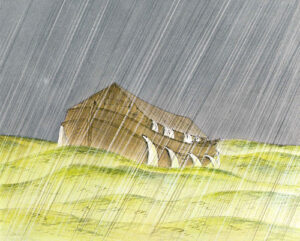 [On October 4 of 2022 I was invited to sit on a panel at the Church of the Redeemer that was addressing this question: What if the Diocese of Toronto took climate change seriously? Moderated by the Bishop of Toronto, Andrew Asbil, four panelists were asked to address this question in a way that also responded to a talk at an event called “Earth Song” given at the church a few days earlier by the Hon. Elizabeth May. Ms May was the leader of the Green Party of Canada, is a sitting member of the House of Commons, and an Anglican Christian. These are my opening remarks to that panel discussion.]
[On October 4 of 2022 I was invited to sit on a panel at the Church of the Redeemer that was addressing this question: What if the Diocese of Toronto took climate change seriously? Moderated by the Bishop of Toronto, Andrew Asbil, four panelists were asked to address this question in a way that also responded to a talk at an event called “Earth Song” given at the church a few days earlier by the Hon. Elizabeth May. Ms May was the leader of the Green Party of Canada, is a sitting member of the House of Commons, and an Anglican Christian. These are my opening remarks to that panel discussion.]
 In her eloquent and passionate address the other night at “Earth Song,”
In her eloquent and passionate address the other night at “Earth Song,”
Elizabeth May said that it was
time for the church
to “kick some ass”
and “overturn some tables.”
Apart from a reference to divestment in the fossil fuel industry
–which would require overturning some financial tables in our lives–
she didn’t specify which asses needed to be kicked in the church.
Indeed, her talk seemed to have deliberately avoided specificity
when it came to the church taking climate change seriously.
But she did refer to our faith and hope,
and she did refer to the story of Noah.
It was heartening to hear Ms May testify that
without her Anglican faith she’d be toast.
And her comment that in Genesis 9
the covenant and promise is between God
and all creatures on the earth was important.
As was her observation that while
God promised never to destroy the earth again,
a corollary promise from humankind
was not secured in that covenant.
There is much to be said tonight,
but I’d like to take my lead from Ms May
and talk about Noah and faith.
First, if the climate crisis is the defining issue of our age,
if humanity is indeed on the precipice of what
may well be a great extinction,
if planet earth is undoubtedly becoming
uninhabitable for future generations,
that is, if our crisis, our eco-emergency
is frighteningly parallel to
the ancient story of Noah,
then we should ask the question, WWND.
What would Noah do?
Well, what was Noah commanded to do?
He was commanded to drop everything
and to get to work on an
emergency species survival strategy.
He wasn’t asked to add the building of an ark
to the rest of his busy life of farming,
engaging in trade,
local tribal council and maintaining
the social and religious structures of his community.
No, all of that was to be left behind,
so that all of his energy would be given to the ark,
all of his energy was to be devoted to the only
issue that really mattered,
the defining issue of his time,
that a climate emergency was upon him.
If the over-heating of our planetary home
is the defining crisis that Elizabeth May says it is,
then there can be no “business as normal” in our lives,
and certainly not in the life of the Diocese of Toronto.
Let me give one example.
The Diocese has posted a position for a Diocesan Missioner.
What is the calling of a Diocesan Missioner
in the context of climate emergency?
If we are looking for a deeper creation spirituality,
an imagination of creational renewal
in the face of climate crisis,
pastoral care and evangelism
in a context eco-grief and culture wide anxiety,
then what do we ask a missioner to do?
You see, there can be no real congregational development
apart from place.
We already know that.
We already do demographic,
socio-economic and historical analysis
as we think through congregational development,
church plants and re-boots.
So, what happens if attention to the climate crisis
is integral to congregational development?
If the climate crisis is the defining issue of our time,
then doesn’t the mission of the church
need to be directed and shaped by this issue?
And yet, in the job description for a Diocesan Missioner
there is no reference to the climate crisis at all,
no identification of this crisis as the context for our mission as a church,
no sense that the candidate should know or care
about any of this.
 You see, in the face
You see, in the face
of the climate crisis,
getting bums in the seats
may not be quite as important
as getting feet on the ground,
fingers into the soil,
bodies standing before the pipelines.
I don’t see how we can faithfully fulfill
our mission as a Diocese
without the climate emergency
being at the very heart of that mission,
shaping everything we do.
This leads me to my second point.
2. Repenting of Heaven
Without Faith we are Toast
… or … with the faith we presently have
we are already toast
Ms May noted that we have moved directly
from denial to despair
when it comes to climate change.
And she beautifully said that the church
had faith and hope to offer
a culture and a world in such a crisis of despair.
But my question is, what faith and what hope?
Our time is too short for me to address
all the matters of faith and hope
in the Anglican Church that need radical reformation,
but I do think we need to talk about Heaven.
You see, just as truth and reconciliation
with the original keepers of this land
is impossible without denouncing
and repealing the Doctrine of Discovery,
so also, I suggest,
must we denounce and repeal a Doctrine of Heaven
that will always leave this earth behind
(in all of its climate destruction)
for a better place somewhere else.
We must abandon a dualistic doctrine of heaven
in our preaching, teaching, prayers and hymnody.
The dualism of heaven and earth,
soul and body,
eternal and temporal,
sacred and secular,
grace and nature,
spiritual and material
will always undermine
our care and commitment to this earth,
and will always legitimate a spirituality of escape.
Without a dramatic shift away from the dominant heaven eschatology,
there will never be the spiritual foundation
or resilience in the church to face the climate crisis.
If we believe our ultimate goal is to live in heaven,
then we will never care for creation
with sufficient passion or love.
This will require a massive undertaking
of unlearning centuries of bad theology,
embedded in our prayer life,
our hymnody and our theological education.
We must repent of a dualistic theology of heaven
if we are to be faithful to this good,
yet deeply broken world,
that we receive as gift and responsibility.
We must repent of a dualistic theology of heaven
If we are to offer real hope
in the midst of climate grief and anxiety.
We must repent of a dualistic theology of heaven
if we are to take the climate crisis seriously
as the body of Christ broken in our world.
There are all kinds of liturgical, pastoral, institutional,
economic, evangelistic, congregational, educational,
and discipleship implications of the climate crisis
that we need to talk about,
but without the single-mindedness of Noah,
and a radical commitment to this earth,
rooted in a transformative theology of creational renewal …
we are, as Ms May put it, “toast”.
Indeed, burnt toast.
Postscript
 The definitive book on repenting
The definitive book on repenting
of a dualistic heaven theology
is J. Richard Middleton,
A New Heaven and a New Earth:
Reclaiming Biblical Eschatology (Baker Academic).
I have engaged Richard’s book at some length here.
The full panel discussion can be listened to here.
